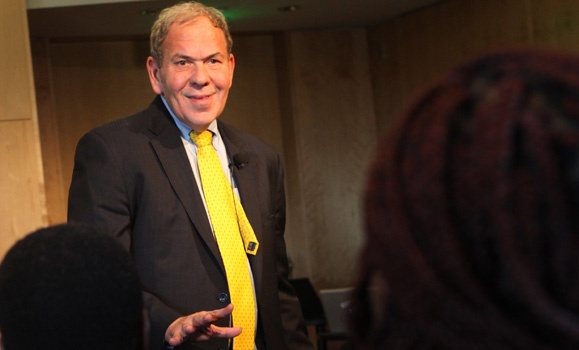Throughout his career Arthur Levine has had to deliver tough messages. When he became president of the Teachers College at Columbia University, he was called to New York's City Hall to meet with then Mayor Rudy Giuliani. The politician wanted to share his views on what he felt was the terrible state of the city’s public schools.
Dr. Levine, , was furious.
‚ÄúI said, don‚Äôt you realize that your industry is in the same shape as mine?‚ÄĚ he recalls. ‚ÄúYou think people in schools are less able than they were in the past. We think the same thing about politicians. And, we both want someone different in the other person‚Äôs job.‚ÄĚ
Mayor Giuliani never invited him back to city hall.
When he comes to H¬ĢĽ≠, he will deliver another tough message. Automation, he says, is going to create massive upheaval in labour markets that universities are currently unprepared for, and that without a transformation in the way higher education is delivered the results for society will be dire.¬†
Education that drives change
It’s a stark message coming from one of America’s leading thinkers examining issues facing today’s educators. In addition to his tenure at Columbia University, he served at Harvard University as the Graduate School of Education’s senior lecturer and chair of the university’s Higher Education Program and Institute for Educational Management.
Now, as president of the Woodrow Wilson National Fellowship Foundation, Dr. Levine leads one of the America’s foremost organizations promoting leadership development and organizational capacity in education. Established at the end of the Second World War, the foundation was created to encourage young scholars to join the academy to serve the tidal wave of soldiers returning home from war.
Today, the foundation‚Äôs mission remains constant ‚Äď to identify and develop talented educators and programs to address society‚Äôs greatest challenges. Dr. Levine says that the next major tsunami universities need to prepare for is the wave of job displacement that promises to strike as automation begins to supplant humans across large swaths of the labour market.¬†¬†
The impact of automation
As an example, he points to the trucking and delivery industries in the U.S., a sector that leads in job numbers in 29 of 50 states.
‚ÄúWith autonomous vehicles coming, we know those jobs have a limited amount of time, and when they go they will take jobs at hotels, food stops and a whole host of related industries. If we start planning now and begin retraining those people, there is a better chance for creating a healthy and more humane society.‚ÄĚ
And it’s not only truckers. Dr. Levine notes automation is set to create large-scale job loss in professions that require a great deal of education but involve routine work such as journalism, medicine and law. He says highly educated people will find themselves with the need to upgrade or retrain, and that universities should be planning to help these people now, before they lose their jobs.
‚ÄúWe‚Äôre going to see an incredible influx of students who want just-in-time education ‚ÄĒ who need a new computer language by next week ‚ÄĒ rather than just-in-case education, which is what degree programs provide. Because of the nature of the speed of change and the half-life of knowledge, these students will be the new majority in higher education.‚ÄĚ
For Dr. Levine, it‚Äôs not a question of whether universities should be transformed to meet the needs of our global, digital and increasingly automated economy ‚ÄĒ¬†‚Äúthe only question,‚ÄĚ he says, ‚Äúis who is going to do it.‚ÄĚ He believes universities should be leading the charge and be in control of their own destinies.
Taking the lead on campus
Dr. Levine says that because of the front-line role continuing education units play, they are uniquely placed to champion the innovation universities need to help society overcome the challenges of displacement.  
He notes that continuing education has pushed a good deal of the advances made in online education and other forms of program delivery that allow for flexible learning on a massive scale. It is this kind of innovation, he says, that will help universities meet the enormous need for reskilling and upgrading that is to come.
‚ÄúContinuing education has been dealing with these kinds of issues since its inception. The reality is that universities as a whole need to figure out what they want to do about the challenges of automation. I suspect most will have to embrace it and continuing education will lead the way.‚ÄĚ
If they don’t, he says the stakes are incredibly high.
‚ÄúIn times like the present, we‚Äôre set to witness job loss and job change and demand for more frequent training than ever before. We‚Äôre also witnessing a rapid redistribution of income and wealth. Unless we do something about it, the number of poor will grow, and the middle class will continue to shrink. This is a classic recipe for undermining a democratic society.‚ÄĚ
The will take place on H¬ĢĽ≠‚Äôs Studley Campus from May 28 to 31 and will gather more than 180 continuing education professionals from across the country. Registration for the entire conference or individual keynote presentations remains open until the conference begins.¬†

